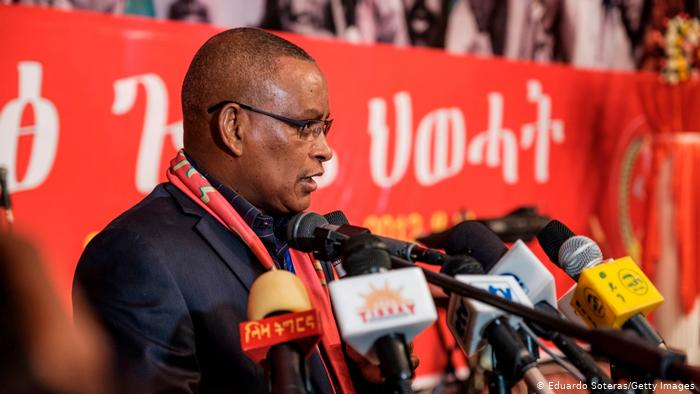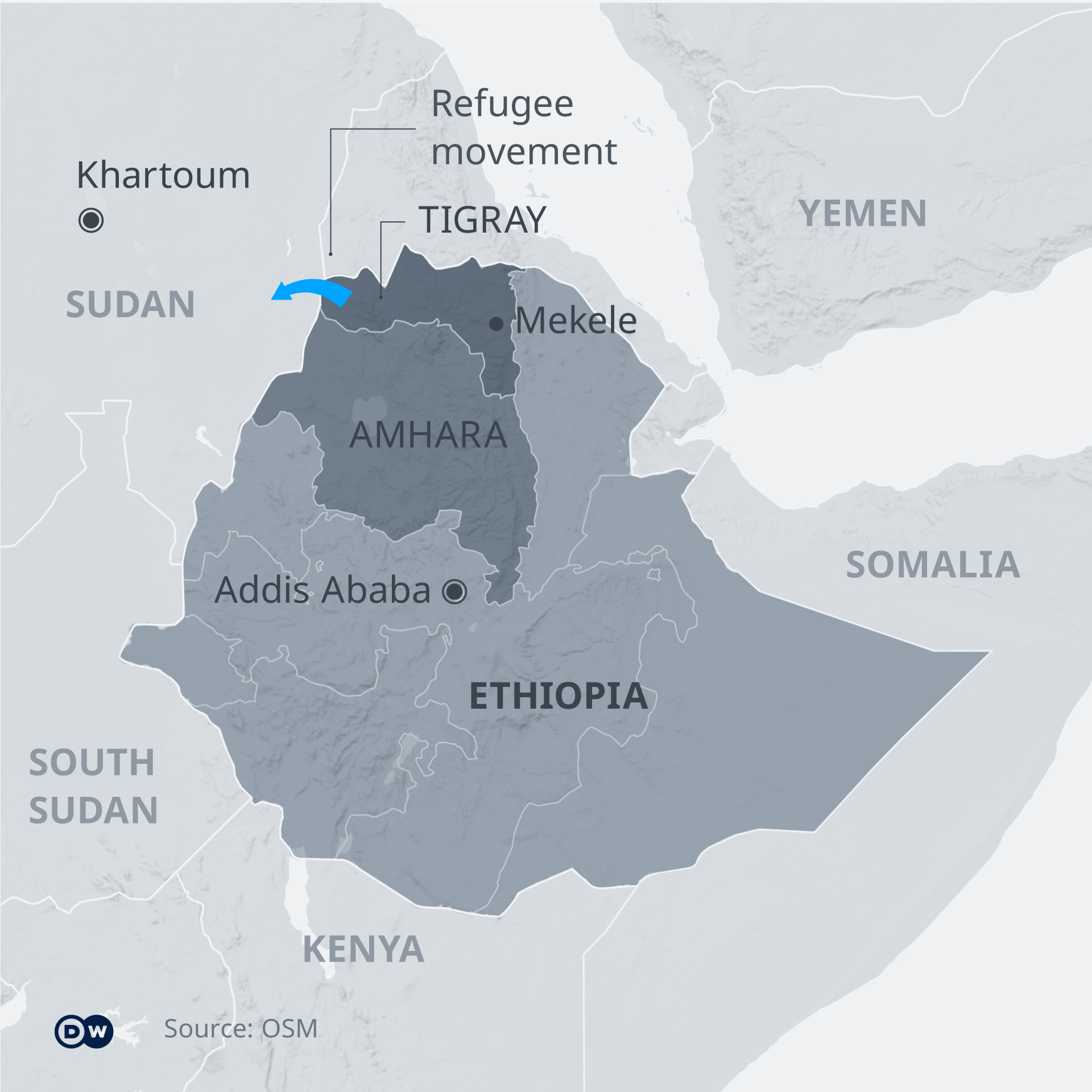www.aljazeerah.info
News, November 2020
Archives
Mission & Name
Conflict Terminology
Editorials
Gaza Holocaust
Gulf War
Isdood
Islam
News
News Photos
Opinion Editorials
US Foreign Policy (Dr. El-Najjar's Articles)
www.aljazeerah.info
|
Editorial Note: The following news reports are summaries from original sources. They may also include corrections of Arabic names and political terminology. Comments are in parentheses. |
Ground Combat and Airstrikes Between Ethiopia's Federal Government and the TPLF Continue, Raising Fears of a Full-Scale Civil War
November 19, 2020
 |
 |
| Tigray People's Liberation Front (TPLF) leader Debretsion Gebremichael has remained defiant despite aerial bombings. | Map of Ethiopia and neighboring countries, November 14, 2020 dw |
TPLF Leaders using Churches as Shelter, Govt says
Ethiopian Monitor, November 19, 2020
ADDIS ABEBA –
The government has said the Tigray People’s Liberation Front (TPLF) leaders of hiding themselves and weaponries in religious institutions.
“The leaders are now leaving their houses and hotels… and they are using churches for both to store arms and to send propagandas from there,” Redwan Hussein, spokesman of the state of emergency task force in Tigray, told CNN.
As the fighting between the federal soldiers and TPLF forces rages in the region for a second week, Redwan said that national defense forces have now taken control of Shire, northwest of Mekelle, and Alamata, south of the city.
“They are closing in but it will take about 100-200 km from several directions,” the spokesman said.
TPLF forces destroyed four bridges on the road to Mekelle to stop national forces from advancing, according to Army Chief Berhanu Jula.
The federal government launched a military offensive in the restive Tigray region on November 4 after accusing its ruling party, the TPLF, of attacking federal army bases in the northern region.
Army Chief Berhanu confirmed TPLF officials are using religious institutions as their base. He also said TPLF’s plan has already faltered and the group “is now in a state of desperation”.
“The TPLF’s plan to drag Ethiopia into civil war and tear it apart has failed. It is currently in a desperate mode as it is surrounded,” Berhanu said during a press conference on Monday.
The two-week conflict has killed hundreds and sent 30,000 refugees into neighboring Sudan. Information from all sides has been impossible to verify because internet and phone connections to Tigray have been suspended.
https://ethiopianmonitor.com/2020/11/19/tplf-leaders-using-churches-as-shelter-govt-says/
Ethiopian Federal Army Begins Final Offensive on TPLF Forces
Ethiopian Monitor, November 17, 2020
ADDIS ABEBA –
Prime Minister Abiy Ahmed says “the final and crucial” military operation will launch in the coming days against forces of Tigray Peoples Regional Forces (TPLF) in Northern Ethiopia.
In a message posted on Social media, Abiy said a three-day deadline given to the TPLF leaders and special forces “has expired today.”
“The final critical act of law enforcement will be carried out in the coming days,” he added.
Abiy’s warning came after his forces struck unspecified TPLF targets outside the Tigray capital Mekelle, a government emergency task-force said.
The task force has called the airstrikes “precision-led and surgical” and denying the Tigray government’s assertion that civilians had been killed.
The Prime Minister ordered a military operation against the TPLF forces following their attack on federal army bases in Tigray Region on November 4, 2020.
https://ethiopianmonitor.com/2020/11/17/fed-army-begins-final-offensive-on-tplf-forces/
***
Ethiopia: A timeline of the Tigray crisis
DW, November 14, 2020
Civil war, ethnic tensions, and broken promises: The ongoing power struggle between Ethiopian government forces and Tigrayan leaders has deep roots.
February 1975: The Tigray People's Liberation Front (TPLF) is founded.
After Emperor Haile Selassieis overthrown in the 1974 revolution, a military junta known as "The Derg" quickly fills the power vacuum. The subsequent civil war has a devastating impact on the country, including the Tigrayan people in the north. Tens of thousands of young people are murdered in a brutal political repression campaign known as Ethiopia's "Red Terror." To fight back and destabilize the junta, eleven men establish the Tigray People's Liberation Front (TPLF).
June 1991: TPLF overthrows the government.
In less than two decades, the TPLF evolves into the most powerful armed liberation movement in Ethiopia. In 1991, TPLF and coalition partners defeats the military government. For another two decades, the TPLF dominates Ethiopia's ruling alliance, the Ethiopian People's Revolutionary Democratic Front (EPRDF). During its 27 years in power, child mortality rates fall, and large-scale famine is banished. But Ethiopia remains a one-party state, and a growing generation of youth feels increasingly excluded and disillusioned by the apparent domination of Tigrayan politicians. Abiy and his supporters refer to this period as "27 years of darkness."
April 2018: Abiy Ahmed sweeps to power after a popular uprising.
After years of anti-government protests, Hailemariam Desalegn steps down as prime minister. Abiy Ahmed is elected leader by the EPRDF, becoming the country's first Oromo leader – Ethiopia's largest ethnic group, which for years claimed to be marginalized by the EPRDF. During his acceptance speech, Abiy promises significant political reform and unity among the Ethiopian people, sparking optimism even among opposition groups.
2018 – 2020: Abiy implements wave of reforms.
True to his word, Abiy begins implementing many of his reforms. Ethiopia – and the world – watches closely as he releases thousands of political prisoners, unblocks hundreds of media channels, and privatizes state-own enterprises. In 2019 he is awarded the Nobel Peace Prize for resolving the long-running conflict between Ethiopia and Eritrea.
But Abiy's reforms also upend the country's long-established power dynamics. Tigray's leaders say they are unfairly targeted in corruption trials and used as scapegoats for the country's problems. In 2019, the TPLF refuses to join Abiy in forming the nationwide Prosperity Party after Abiy dissolves the EPRDF, which was dominated for decades by the Tigray People's Liberation Front.
August – September 2020: COVID-19 hits, and elections are postponed.
Abiy postpones the much-anticipated August 21 general elections as the coronavirus pandemic takes hold in Ethiopia. His decision doesn't sit well with the TPLF party, which accuses Abiy of unconstitutionally extending his government's term. In defiance, they create their own electoral commission and hold separate regional elections. Abiy's government, in turn, accuses the TPLF of unlawfully holding their own polls, further raising tensions.
November 4, 2020: Tigray regional forces launch surprise attack.
Security forces loyal to the TPLF unexpectedly attack the Northern Command of the Ethiopian National Defense Force (ENDF) in Tigray region's capital, Mekelle. Several people are killed. The TPLF claims the strike was carried out in "self-defense."
Abiy responds by saying the TPLF has "crossed a red line" and a military offensive will be launched. Authorities shut down internet, telephone, and electricity services in Tigray, while the Tigray Regional Administration forbids all forms of transportation, including flights.
November 6, 2020: Abiy government launches counter-airstrike.
Abiy confirms his government launched an airstrike against Tigray forces, destroying many rockets and other weapons. He also claims the TPLF rejected the government's attempts at "mediation, reconciliation [and] dialogue."
Sudan responds to the escalation in violence by closing its borders with Ethiopia, while the United Nations (UN) urges a swift and peaceful resolution.
November 7, 2020: Parliament declares Tigray government illegal
During an emergency session, Ethiopia's parliament deems the Tigray government illicit and votes to form an interim government for the northern region.
November 9, 2020: Mai Kadra massacre
Against the backdrop of ongoing battles between the Ethiopian federal government and Tigray forces, up to 500 civilians are killed in a massacre in Mai Kadra near the Sudanese border. According to Amnesty International, witnesses say Tigray forces were responsible for the killings after suffering a defeat from the federal government forces.
November 10-13, 2020: Refugees on the move
As sporadic violence continues in the north, a wave of refugees flees to neighboring Sudan. On November 11, approximately 10,000 refugees are reported to have crossed the border, including many soldiers. That number has since increased to 25,000, according to Sudanese officials.
November 14, 2020: Rocket attacks in Asmara
Multiple rockets launched from Ethiopia hit Eritrea's capital, Asmara. TPLF leader Debretsion Gebremichael says Asmara was a "legitimate target" because Ethiopian government forces were using its airport to carry out attacks on TPLF fighters. While Eritrea continues to deny its involvement in the conflict, the attack fuels ongoing concerns of a broader regional conflict. UN Secretary-General Antonio Guterres warns the fighting must not escalate further, saying, "Ethiopia's stability is important for the entire Horn of Africa region."
Present: Civil war on the horizon?
Ground combat and airstrikes between Ethiopia's federal government and the TPLF continue, raising fears of a full-scale civil war.
On November 15, Abiy said the war in the Tigray region was "irreversible."
There are also concerns a protracted conflict in Ethiopia could impact the already-fragile Horn of Africa, especially in neighboring countries including Somalia, Eritrea, Djibouti, and Sudan.
https://www.dw.com/en/ethiopia-a-timeline-of-the-tigray-crisis/a-55632181
***
Share the link of this article with your facebook friendsFair Use Notice
This site contains copyrighted material the
use of which has not always been specifically authorized by the copyright
owner. We are making such material available in our efforts to advance
understanding of environmental, political, human rights, economic,
democracy, scientific, and social justice issues, etc. We believe this
constitutes a 'fair use' of any such copyrighted material as provided for
in section 107 of the US Copyright Law. In accordance with Title 17 U.S.C.
Section 107, the material on this site is
distributed without profit to those
who have expressed a prior interest in receiving the included information
for research and educational purposes. For more information go to: http://www.law.cornell.edu/uscode/17/107.shtml.
If you wish to use copyrighted material from this site for purposes of
your own that go beyond 'fair use', you must obtain permission from the
copyright owner.
|
|
|
|
||
|
||||||


